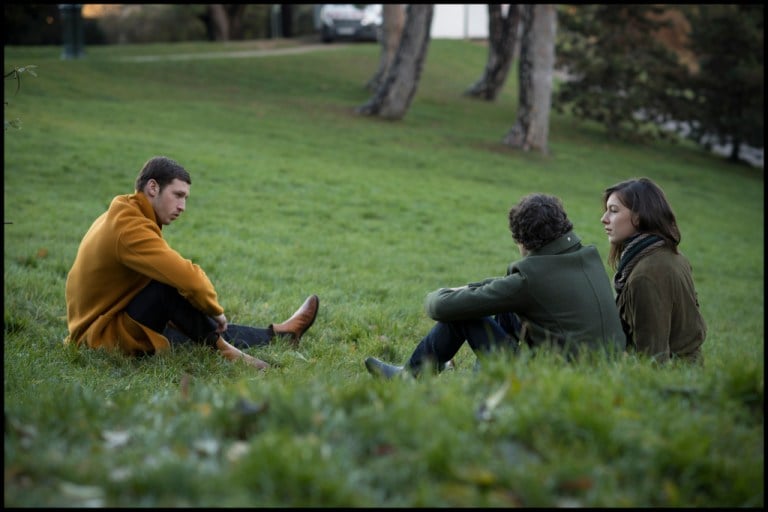We begin in Paris with the “rebirth” of Yoav, a disoriented Israeli fleeing a country that has fled him, who in his disillusioned madness turns to a new nation to recreate himself. The film “Synonym” (2019) opens in complete silence and darkness, devoid of any dialogue, light leaking into a shadowed room ever so slowly. And this is precisely how the story unfolds — in renouncing his Israeli nationality for a French one to start anew, the main character slowly learns the language of a new nation in a desperate attempt to redefine his life.
Like a child discovering language for the first time, Yoav must learn how to communicate again. The film focuses a lens on language as selfhood, identity as rooted in the spoken word. In refusing to speak Hebrew, Yoav firmly rejects his Israeli history; as he speaks French, he desperately reaches for a new identity he thinks will make his life better than it was. We witness this in the film as Yoav never speaks a word of Hebrew for as long as this disillusionment clouds his judgment; he speaks English and French to his family and friends back home, even staying silent when his father arrives in Paris to see him in person. In fact, Yoav is so adamant about disassociating from Israel that when he decides he wants to write stories and is asked what language he will write them in, he answers confidently that it will be French. And yet, ironically, he does not even know many of the words of his stories in French.
To achieve all of this, the film introduces experimental methods of storytelling in its explorative cinematography, particularly with point-of-view shots and disorienting camera angles that leave the audience dizzy, seeing the frenzied streets of Paris as Yoav does. The movie also makes an interesting choice of pairing the main character’s voiceovers discussing the past with scenes of his present reality in Paris. The audience certainly gets a glimpse into the disorienting chaos of a new reality, left with jarring unsteadiness as we learn the lay of the land with Yoav.
Woven into this main story is also a subplot about the relationship Yoav develops with Émile, a struggling writer with a hefty inheritance. Émile represents the aestheticist who can only write after drowning himself in ritual inebriation. Yoav cynically rejects any aestheticist worldview, saying that “The Seine is a test that the city sets you,” while Émile responds, “Some landscapes are so beautiful it is a perversion not to look at them.” The relationship between Yoav and Émile deepens throughout the film, bordering romantic and sexual desire. Hearkening back to the classic Renaissance friendship between two men, Yoav and Émile develop an intimate relationship bonded by Yoav’s stories and Émile’s hunger to write. There are quite a few moments in the film where there is a silence between the two characters that is so unnervingly long that it is almost as if there is a story going on in the characters’ heads that the audience cannot see, thoughts only they are sharing, the audience simply watching. At a climactic moment in both Yoav’s individual life in Paris and in his relationship with Émile, Yoav gives his stories to Émile; he gives away his stories of his past, and in doing so purges himself of his memories and rids himself of his past life in Israel.
What ties together the whole film and our takeaway from it, though, is the theme of perversion. Perversion of the land — of Israel — is what pushes Yoav to the arena of Paris, where he finds himself perverting his own identity and his own body, ironically all for the sake of preservation. To preserve the self he must pervert the self. He gives away his identity, the stories of his past, because he thinks this will create a new scaffold for him to build a new life upon. He sells his body to the military, to the state and in the basest means, to the media. We go through a tragic journey of self-discovery where our main character tries desperately to create a self, while he ironically becomes the crucial key to defining everyone around him. He exists not for himself, but as the stories for Émile, the sexual rebellion for Émile’s girlfriend Caroline, the hopeful immigrant for France.
However, it is in his sexual catharsis that both he and the film climax — in the moment of greatest release, Yoav speaks his language for the first time, primitively and angrily. This then spurs his recollection of his whole identity as he experiences an epiphany that throwing away his past does not resolve the disagreements he has with his home country. When Yoav takes the stories back from Émile, he says, “They’re nothing special. But they’re mine.” In a final, symbolic rejection of his disillusioned French ideal, Yoav bursts into a mad fit that rejects the French culture he’d so blindly idealized early on. While he attempted ever so desperately to dig for a new life away from all he’d known, perhaps what he found in the French language were merely synonyms of the core he knew — Israel. And after watching this disorienting, cathartic journey of a film, perhaps many of us, too, may find ourselves clinging tighter to a past we had previously been ashamed of.
Contact Angelina Hue at ahue ‘at’ stanford.edu.
